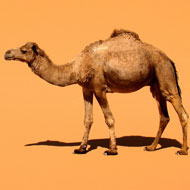Scientists to explore how camels survive dehydration

Scientists aim to better understand how animals adapt to deserts and climate change.
Bristol researchers are set to explore how the one-humped Arabian camel can survive in the hot, dry desert, where water is scarce.
The University of Bristol has received a grant from the Leverhulme Trust and will work with scientists in North Africa and the Middle East, in a bid to better understand how animals adapt to deserts and climate change.
Camels conserve water through a ‘molecular dialogue’ between the brain and kidney. If the camel cannot find water, its blood becomes more concentrated, which signals the brain to release more antidiuretic hormone (ADH) into the bloodstream. ADH tells the kidney to conserve water by producing a low volume of highly concentrated urine.
Researchers at Bristol Medical School recently sequenced the genome of an Algerian camel. Using this resource and samples from colleagues in the United Arab Emirates, researchers will now look at how global gene expression changes in the camel’s brain and kidney, in response to chronic dehydration.
Lead author Professor David Murphy said: “We are in a unique position to examine the specific molecular functions of these genes as we have developed methods that allow us to manipulate their activity within model organisms. We can ask how altering the activity of a specific gene affects the physiology of the organism in terms of its response to dehydrating cues.”
Image: Bjørn Christian Tørrissen/CC BY-SA 3.0



 The BSAVA has opened submissions for the BSAVA Clinical Research Abstracts 2026.
The BSAVA has opened submissions for the BSAVA Clinical Research Abstracts 2026.